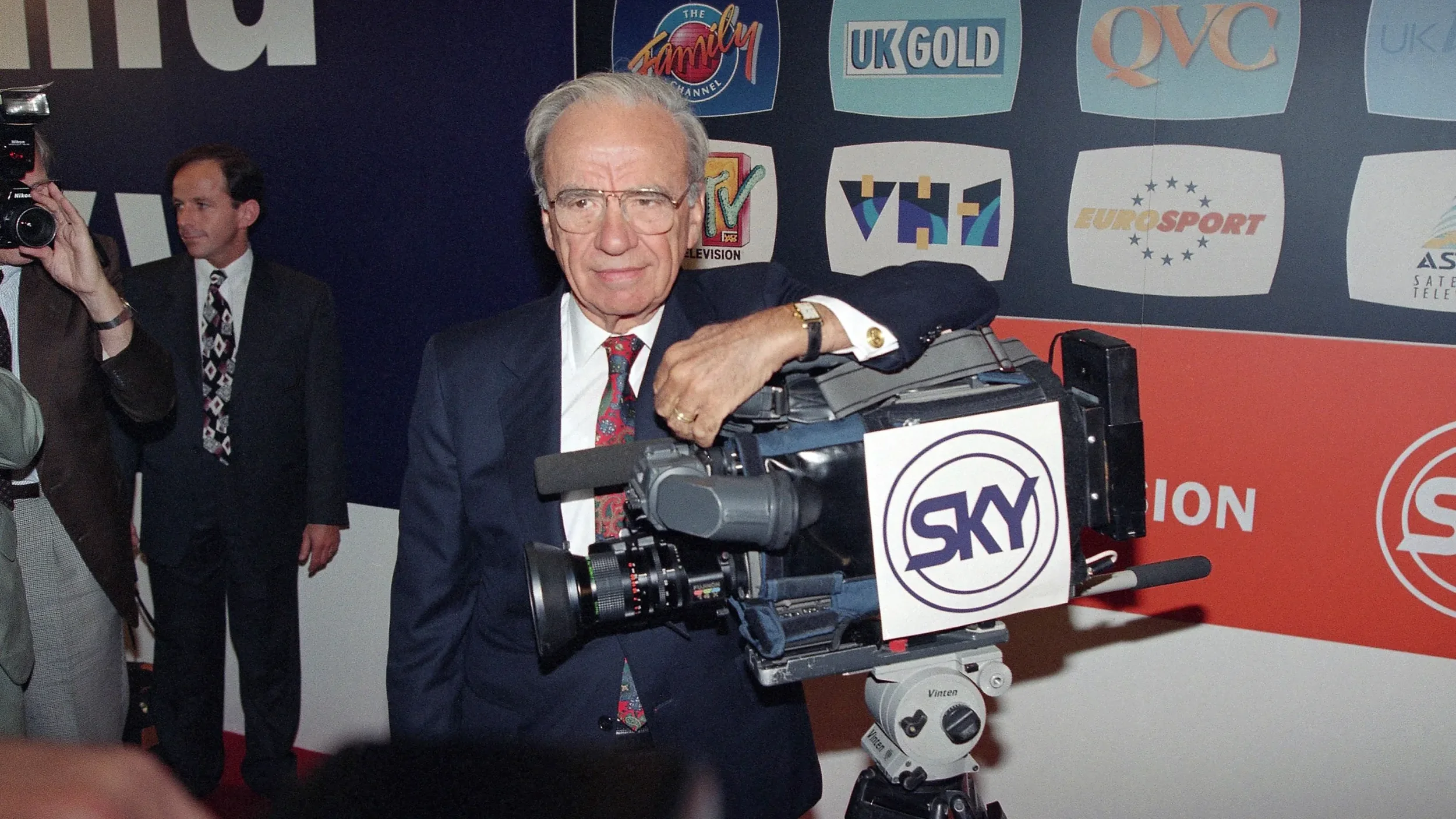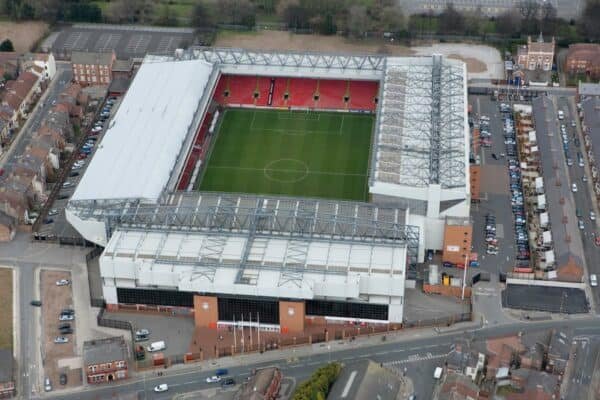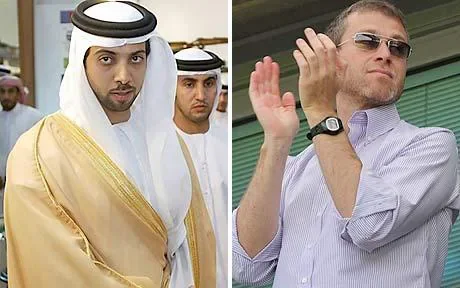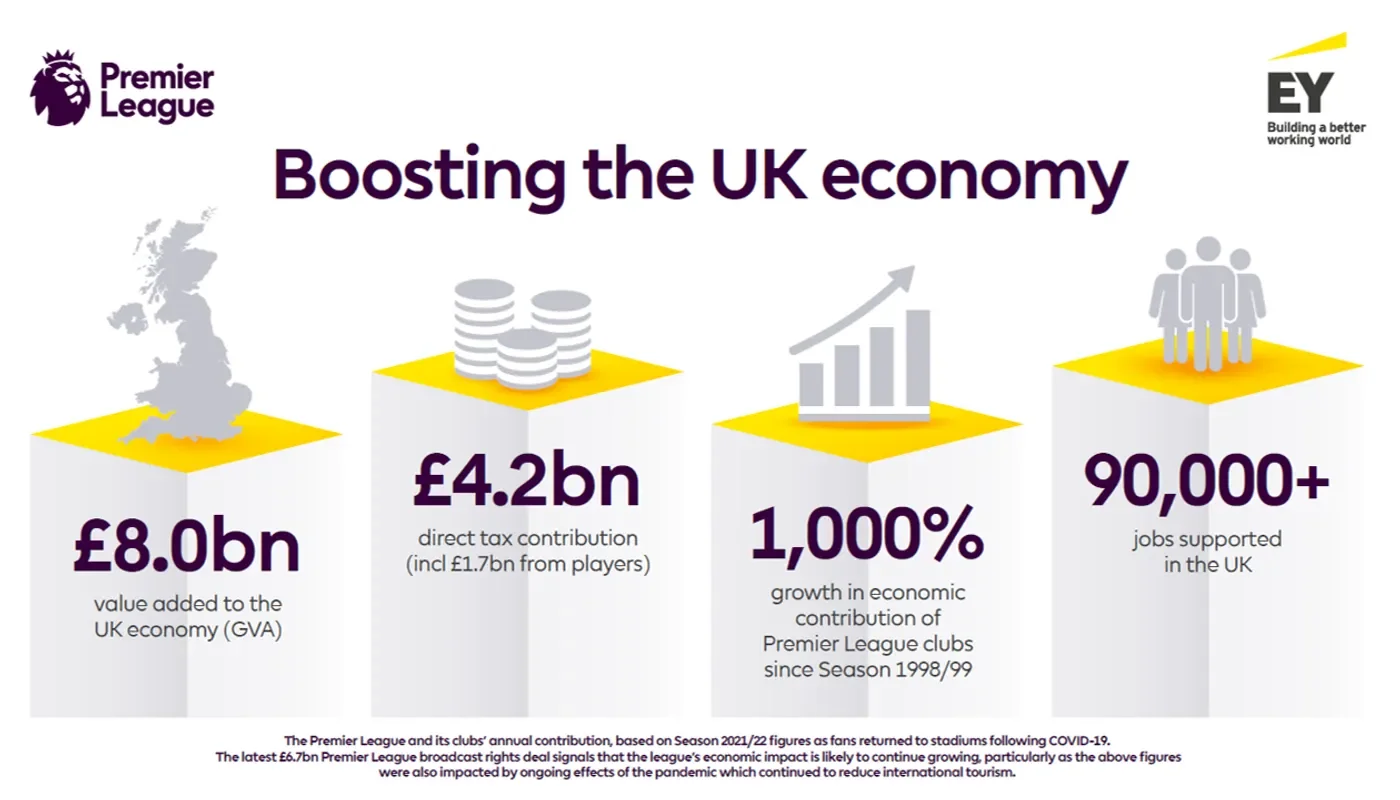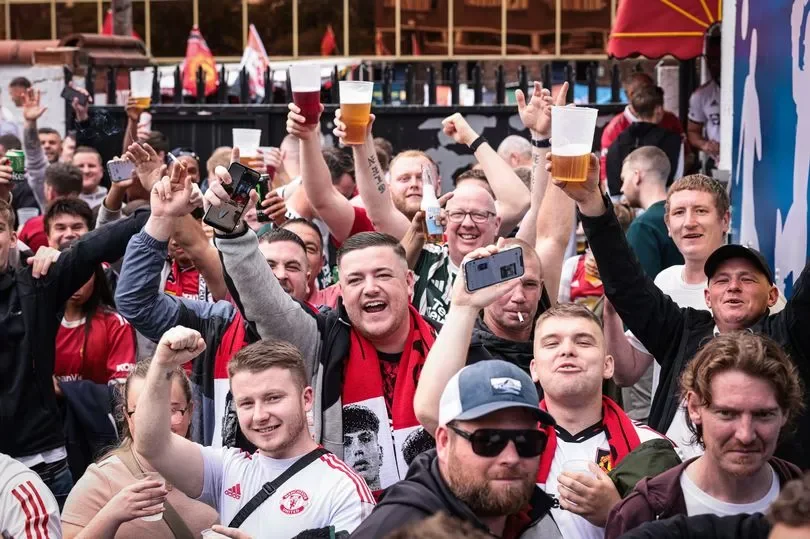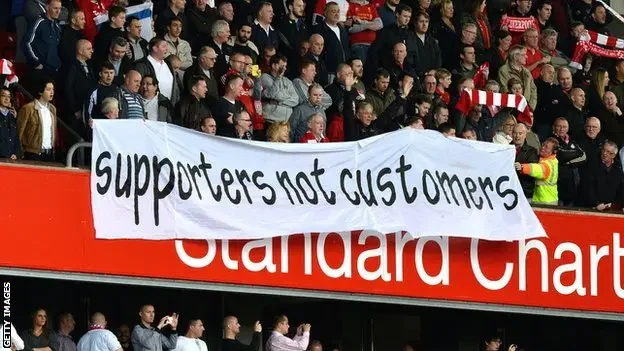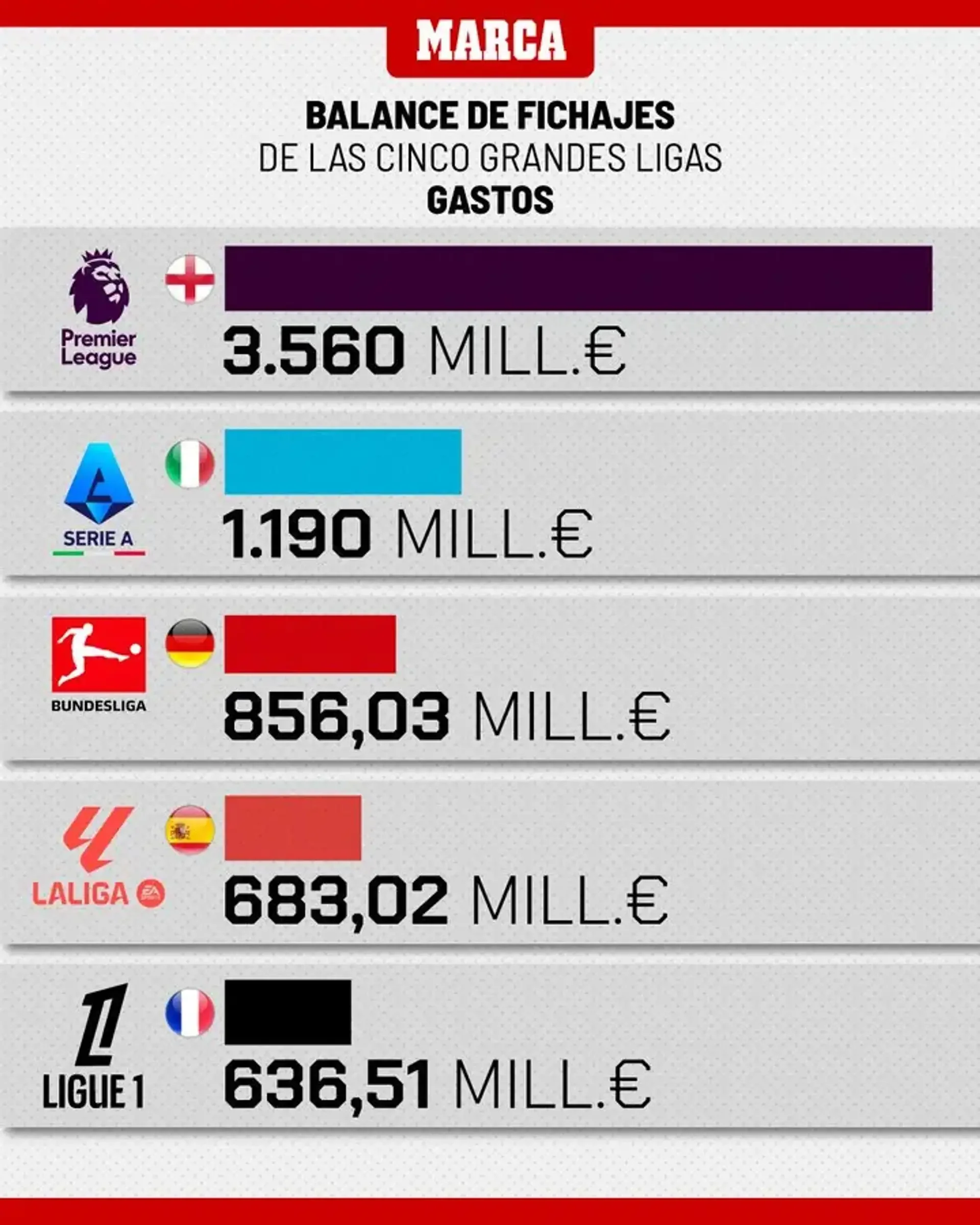The English Premier League (EPL): a source of national pride or a corporate machine that has gone too far…?
badges & logos of some of the biggest clubs in English football
photo credit: skysports.com
Introduction: the English Premier League (EPL)
As a lifelong fan of football (soccer, not American football for clarity), I was able to experience observing the rise of the EPL from its beginnings in 1992 to the present day. As a British person coming from England and now living in East Asia, it has been extraordinary to see with my own eyes how big the EPL has become. Observing the presence of EPL culture around the world never ceases to amaze me and to a degree, makes me proud to be English. But, the rise of the EPL globally has also moved the cost of watching EPL football to unprecedented levels. The big EPL clubs have been elevated to levels of power and influence that would likely have been beyond the imagination of most British fans that witnessed its birth in 1992. In 2025, should the EPL be considered a source of national pride for the UK or has its power in the world of club football gone too far? Have EPL boardrooms & elites become too distant from the lifeblood of any football club: its loyal fans & supporters?
1992: The English Premier League begins…
Left: EPL legend Teddy Sheringham.
Centre: The winners of the first premier league title, Manchester United, in 1993. This would be the start of two decades of Manchester United dominance until manager Alex Ferguson’s retirement in 2013.
Right: Vinnie Jones who won the 1988 FA Cup with Wimbledon in one of the biggest upsets in sporting history. He later went on to be a Hollywood film star.
photo credit: metro.co.uk
A watershed moment in English (and arguably world) football history was the creation of the EPL when its inaugural season kicked off in the summer of 1992. I have particularly vivid memories of this period as not only was I a keen fan of football at the time (both playing and watching), I was starting secondary school at the age of eleven, which is the British equivalent of starting middle/high school in America. Other than the new, ‘no pass-back to the goalkeeper’ rule being introduced during that season, I remember how the new ‘Premier League’, was running a huge advertising campaign in the national media. But more critically, a new, exclusive TV network (led by the hugely influential Rupert Murdoch) was to be showing the league matches (Sky Sports). It was from this point that watching English elite football was no longer part of the free channels on mainstream television. People had to pay for a satellite dish being installed at the address it was being charged to with a separate subscription. I was extremely fortunate to have parents that could afford to pay for Sky TV and so I was able to watch the live games at home (although if my father were not a big football fan himself, I seriously doubt we would have got it) .
Rupert Murdoch and his satellite TV network BSkyB were an integral part of growing the premier league from the 90s onwards.
Photo credit: .(AP Photo/Martin Cleaver, File) from siouxandproud.com
Early years of the EPL
In spite of all the new branding, it did not personally feel like that much of a change at the time (though I remember the short-lived, American-style cheerleaders at the initial Sky TV games). The players, captains, and managers were still mostly British with crunching, ‘old-school’ tackles a plenty. The crowds were still almost entirely made up of men (particularly away fans), with a mixture of backgrounds though anything above a middle-class background was a rarity. The stadiums were very different it has to be said. The grounds of big clubs like Liverpool, Manchester United, and Arsenal are all either unrecognizable or have moved to a new location. There used to be lots of standing areas as opposed to modern all-seater stadiums, not to mention a lot of people smoking on the terraces! However, after the Hillsborough disaster of 1989, there was a movement to replace stands with seats which is still a subject of much debate today.
above: Anfield now and in the 1990s (photo credit: thisisanfield.com)
A trajectory of immense proportion
In the time that has passed since the summer of 1992 however, the EPL has gone from a strong European league in the 90s to the biggest brand of league football in the world with the highest viewing figures in world football. This dominance combined with the fact that football has the highest viewership of any sport in the world, has led to a huge football industry being built in the UK where the premier league has become an economic powerhouse. Football tourism, media, foreign ownership, and even academic degrees in football-related business fields have all grown to unprecedented levels in recent years. In addition, EPL clubs have the largest social media following of any league in the world and whichever major international airport or city you are in, the chances are you can find a sports bar with the EPL available to watch.
left: a pre-season freindly between Arsenal and Tottenham Hotspur in Hong Kong, 2025 (photo credit: BBC)
right: fans attending a preseason friendly for a club’s summer tour in Asia (photo credit: premierleague.com)
Foreign talent & investment elevating the EPL
On the footballing side, there is no doubt that over the last three decades, the increase of foreign players have helped to improve the skill and quality of the EPL. In the 90s, Cantona, Bergkamp, Zola, and Ginola were gifted footballers that brought more flair & excitement to the English game. In the 2000s, the number of foreign talent increased and players such as Vieira, Henry, Cristiano Ronaldo, and Drogba were just some of the amazing superstars that graced English stadiums across the country. Foreign managers & coaches such as Wenger, Mourinho, and Guardiola also brought new ideas with winning ways.
Foreign owners such as Roman Abramovich of Chelsea and Sheikh Mansour of Manchester City, put what seemed to be endless amounts of money into their clubs that pushed them both to EPL titles and Champions League wins (CL). Six of the top ten richest football clubs in the world are also in the EPL with player transfer fees and wages the highest of all the European leagues.
top left: Bergkamp, Cantona, and Zola were some of the foreign players that brought skill levels and technique to new levels in the premier league during the 90s. (photo credit: Steemit.com)
bottom left: Henry, Ronaldo, and Drogba all became global superstars for their respective EPL clubs in the 2000s (photo credit: football 365)
top right: the big-spending foreign owners of Man City (Sheikh Mansour) & Chelsea (Roman Abramovich) who unconditionally gave their clubs huge financial advantage and took them to levels their fans never imagined they could go (photo credit: The Daily Telegraph)
bottom right: French stars such as Ginola and Vieira helped take the technical side of the English game to a new level in the late 90s & early 2000s (photo credit: Shutterstock/colorsport)
Foreign influence & culture wasn’t all positive
But the influx of foreign talent wasn’t all positive. Aside from young local boys having less chances to play first team football, the only real negative aspect of the wave of foreign players coming in was the the culture of diving and feigning injury which started becoming more visible in English football as the EPL became more international. Having to consistently watch physically intimidating, powerful athletes rolling around like petulant teenagers acting as if their limbs had been chopped off (then suddenly running around again) was not something many British fans were used to. In addition, diving in the penalty box started to emerge more and more, with English players also starting to widely partake in this culture. To this day, many football fans (myself included) utterly despise this culture, but it has become an integral part of the game that the authorities largely ignore.
left: the dazzling winger Arjen Robben was not only famous for his pace, dribbling, and goals, but also for his theatrical dives during the 2000s (photo credit: caught offside)
right: Brazilian Rivaldo, a truly amazing talent, but faked being hurt at the 2002 world cup against Turkey after having a ball kicked at him (photo credit: the Guardian)
Great benefits for the UK
Of course, it is beneficial in many ways to have the world’s foremost football league in the country I was born in. I have been able to talk enthusiastically with people all over the world about football, memories of football, and everything about it. In addition, the EPL has helped to regenerate areas that surround football stadiums through boosting local economies, increasing employment opportunities, and so on. Critically for the UK in 2025, the money generated through the EPL has been helping the British economy at a time when the country has faced challenges regarding its business model.
the economic impact on the UK economy (photo credit: premierleague.com)
But, the EPL’s rise has also come with some quite unnerving outcomes. Notably with regards to the price of football for the average person and the current balance of power in club football.
A financial burden for spectators
Aside from having a futuristic-looking satellite dish being put on the roof of our old family home, what I would not have noticed as a young boy back in 1992-93 was the cost of going to football matches at the time. For example, the contrast with regards to the financial cost of going to football matches for people as recently as 2022/23, compared to 1992/93, is staggering to say the least. An integral part of going to a football match for many British football fans is having some drinks in the pub with your friends and fellow supporters. In 1992-93, the average price of a pint of lager was 153p (£1.53) and the average national salary annually was £17,784. In 2022-23, it was 457p (£4.57) and £33,000 respectively, which represents an increase of 198.7% and 85.62%. Then, if we take the average price of a ticket to see a premier league match in 1992-93, it was £13.5 and in 2022-23, £83. This is an increase of 514.8%. Of course, these figures are not exact and may vary from club to club and city to city. But as a rough, average guideline, it is a massive increase in cost for the loyal supporters and fans of EPL clubs.
The financial burden has become clear, with many fans unable to watch their beloved ELP teams, due to the rising costs of going to EPL matches. The atmosphere at matches has also changed with many fans complaining of quieter crowds and “underwhelming” atmospheres at stadiums.
left: West Ham fans have complained about the atmosphere at their new stadium (photo credit: West Ham Utd)
centre: Man U fans enjoying some beer before the game (photo credit: Manchester Evening News)
right: Liverpool fans sharing the same sentiment as fans across the country (photo credit: BBC)
The weakening of other European leagues
The power of the premier league has also affected the capabilities of other leagues across Europe. In the 90s, there were teams from seven different leagues that won the European Champions League. But the balance of power has meant fewer leagues can realistically compete due to astronomically excessive wage bills for players and transfer fees. The EPL has such power and it is causing other strong leagues in Europe to face an uphill task to keep their finest players such as the Bundesliga (Germany).
If you had said to European football fans in the 1990s/2000s that Barcelona (arguably the most glamorous club in the world along with Real Madrid) would be signing a Manchester City ‘reject’ like a fading Sergio Aguero in 2021, they would have laughed at you. But it is a reality in today’s balance of power in the football world. Even AC Milan, one of the most famous and most decorated clubs in world football, have signed average EPL players such as Emerson Royal and Tammy Abraham in recent times. Of course, it can be argued domestic leagues need to nurture their own talent, but the thought of AC Milan buying average EPL players in the 90s and 2000s would have been ludicrous.
In the summer of 2025, EPL teams spent a record £3.087 billion which was a greater amount than what all the Spanish, Italian, German, and French leagues spent during the same period. In spite of this astronomical spending power, English teams do not dominate the European club trophies as perhaps they should. But nevertheless, this level of spending is unprecedented and raises many concerns across European football and the football world in general.
left: the spending power of the premier league (photo credit: tribuna.com)
centre: Emerson Royal went to AC Milan from Tottenham after getting unfavorable ratings as a player in North London. In years previous, a player not performing well at Tottenham would not then go to AC Milan (photo credit: Milanreports.com).
right: Sergio Augero spent his prime years at Man City and managed only five games for Barcelona before having to retire. Again, in past decades, a top player spending his prime years at Man City and then moving to Barcelona as a ‘step-down’ would have been unheard of (photo credit: BBC).
The ancient issue of fairness
Of course, one cannot blame the EPL and its stakeholders for wanting to have the biggest market share of the corporate business that is now professional football.
However, for most fans, supporters, and enthusiasts of football, can the current situation be right? Just because EPL teams have been acquired by foreign, super-rich owners, combined with broadcast-rights deals that give unequivocal wealth advantages over their European counterparts; does that mean the EPL can just vacuum up all the best, young players around the world and have a disproportionate advantage indefinitely?
Inorganic, foreign-donated funding does make a difference: just ask older Chelsea & Man City fans
In the world of business, I suppose the answer to the previous question is, yes. But is it inspiring? From a personal point of view, absolutely not. The emergence of Chelsea and Manchester City as title-winning machines is refreshing for the league in a way (they have won 13 EPL titles between them in the last 20 years, over 60%). But was it through footballing genius? Organically, absolutely not. Roman Abramovich’s arrival in 2003 gave Chelsea finance that supposedly allowed the club to operate while losing around £900,000 a week for the entire 19 years he was there. Make of that what you will, but it is quite remarkable to think a club or business can be deemed ‘successful’ in spite of losing that amount of money that was ultimately covered by a Russian oligarch at his leisure. Manchester City’s rise tells a similar story albeit they have won more EPL titles to date. These two clubs are particularly fortunate that the recent Profit & Sustainability Rules (PSR) have only recently come into force. These rules would have prevented their owners from spending the way they did in order to become the forces in football they are today.
thanks to their foreign, multi-billionaire owners, Manchester City & Chelsea have gone on to dominate the number of English Premier League titles in the last 20 years as opposed to Manchester United & Liverpool who many consider to be the two ‘biggest’ clubs in English football
(photo credit: globe soccer)
Overall feeling: times change and the EPL continues to drift further into the corporate arena leaving traditional fans behind
In the end, the EPL does bring mass tourism and soft-cultural power to the UK (as previously mentioned). It has also helped local communities in the UK which cannot be underestimated.
Spiritually however, for many British people, football used to be an escape from the pressures and stresses of life for both the people of local football clubs and their supporters. For those of us that remember life before the EPL (and beyond for older fans), nothing will take away those memories where players, managers, coaches, captains, and board members were almost entirely people from the same country. These characters of football also had far more in common with the ordinary person in the UK than today’s EPL elite. It can be argued that there have always been dominant teams in English football, but not with the spending power that EPL teams have today globally in comparison. In 2025, the EPL is just a reflection of modern-day life: big corporations dominate and will continue to do so. Perhaps this is wonderful for those who profit or win in this situation. But as the years go by with ordinary people struggling to pay their bills, the connection between the clubs and the generations of fans that have always been there, drifts further apart.
Fan protests have become more common as the costs of going to see EPL clubs continue to rise (photo credit: Jacques Feeney via Getty Images as shown in the Times


